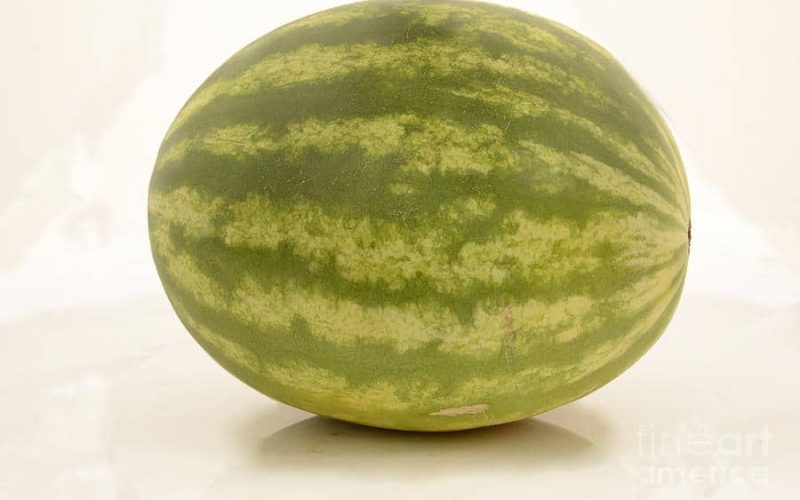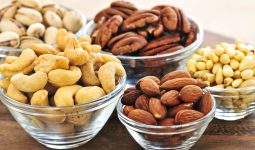Xigua is a Chinese name for “watermelon” meaning western fruit; it is closely related to squash, cantaloupe, pumpkin and cucumbers.
Though Xigua is usually smaller than the regular watermelon, these Chinese watermelons are known to its natives as “non-seed watermelons” and Xigua possess some health benefits to its consumers.
Even in most restaurants, Xigua is usually eaten in slices as dessert and it is pronounced “she gwah”. Watermelons were first recorded in china in the 10th century. The Chinese name (Xigua) as earlier mentioned means “western fruit”, revealing the thoughts that it may not be a native to china.
But the fruit has taken foot in history for about 1000 years now. In the west, the watermelon is very popular, earliest reports describe diverse colors and sizes of watermelons in China but in present times, the familiar big red fruited ones dominate.
Watermelons were brought to the Americans soon after settlement. Some earliest records are from Spanish Florida in 1500s. By about 1657, watermelons can be documented all over North, Central and South America. But China is the world’s leading producers of watermelon.
Nutritional Content of Xigua Fruit
Between citron melons and sweet xigua fruits, there are numerous varieties of watermelons; from small to large, round to oval, with rinds from pale- almost yellow to deep green- with and without stripes, which can be in different colors like white, yellow, orange or red with seed coloration ranging from black to white and Xigua is synonymous to watermelon.
Xigua is also commonly found in Africa. It is quite low in calories but a very good and reliable source of vitamin C (about 20 t0 25 milligrams per slice).
It also contains antioxidant compound that protects the DNA, known as lycopene. This lycopene is quite potent, and it is known to prevent some type of cancer like breast, colon, prostate and lung cancer.
Note that the redder the flesh of the xigua fruit, the riper the fruit, the more lycopene antioxidant it contains.
Produced in over 1200 different varieties worldwide, Xigua Fruit is full of other various nutrients and high valued powerful health benefits. In 100g of raw xigua fruit contains approximately:
- Water (91%)
- Protein (0.6g)
- Carbs (7.6g)
- Sugar (6.2g)
- Fiber (0.4g)
- Calories (30)
- Fat (0.2g)
Vitamins and Minerals
Xigua Fruit also contain some vitamins which makes it very nutritious as mentioned above. Some vitamins and minerals include:
- Vitamin C: Vitamin C is an antioxidant that acts to prevent cell damage and disease. Xigua is a good source of this vitamin and decent source of several other vitamins
- Vitamin A: Xigua contains beta carotene, which the body through some metabolic processes coverts to vitamin A. vitamin A is important for the normal vision, immune system and reproduction. It also helps the heart, kidneys, lungs and other organs function properly.
- Vitamin B5: It is also known as panothenic acid, this vitamin is found in almost all foods to some extent. It is one of the most important vitamins for humans, it is necessary for making blood cells and coverting food into energy.
- Potassium: This mineral is very important in blood pressure regulation and heart health.
- Copper: Most abundant in plant foods as it works with iron in helping the body form red blood cells and also for iron absorption. Copper also helps the blood vessels, nerves, immune system and bones remain healthy.
As we earlier stated, lypcopene is one of the important compounds found in Xigua. Another compound which is also important to the body also contained in this fruit is Citrulline, it is a richly dietary source of amino acid, the highest amount is found in the white rind that surrounds the flesh.
In the body, this citrulline is transformed into essential amino acid arginine where it play an important role in the synthesis of nitric oxide, which helps lower blood pressure by dilating and relaxing the blood vessels. Arginine is also known to facilitate wound healing especially internal wounds on organs.
Health Benefits of Xigua Fruit to the body system.
Regulation of Insulin Resistance
Insulin is a very important hormone produced in the body that regulates blood sugar level. In cases of impudent insulin resistance (a condition in which cells become resistant to the effect of insulin) which can result to elevated levels of blood sugar levels and is linked to type 2 diabetes. Arginine found in Xigua is associated with reduced insulin resistance in recent studies.
Muscular System
One of the most frequent side effects of strenuous exercises is the well-known muscle sore. Watermelon juice is popular to be effective at reducing muscle soreness following these strenuous exercises.
Xigua helps in treatment of many infections in the body, including inflammation of the joints due to the role of vitamins contained in the fruit. It contains 91% of water thereby preventing any symptoms of dehydration in the body.
Immune System
Xigua fruit (non-seed watermelon) contains enough vitamins, particularly Vitamin C, which boosts the immunity of the body system thereby preventing vulnerability to diseases and cell damage.
Digestive System (stomach and intestine)
Fruits are generally known to enhance the quality of the digestive system and the Xigua Fruits is no exception as it contains adequate fiber and water to help enhance and regulate digestion after meals. Regular consumers of this fruit are at low risk of suffering diarrhea, constipation and hemorrhoids.
Renal System (Kidney)
- Consuming xigua fruit on a regular basis decreases the risk of its consumers to get any disorders on their renal system for example, renal infections, kidney stones and other renal diseases. Generally, watermelons can fulfill the necessity of people toward water because the fruit is one of the watery ones.
- Minerals like Potassium in the fruit helps in the regulation of the body’s blood pressure.
Epidermal System(skin)
As we earlier mentioned, Xigua contains high levels of lycopene. This antioxidant can help humans to keep a healthy skin and prevent dangerous UV light from been absorbed by the skin during summer outdoor activities. Also, Vitamin A and C helps the skin to grow healthy and glow.
Cardiovascular System (Heart)
Lycopene inside the xigua fruit also protects the body especially the heart from bad cholesterol. Cholesterol is one of the most dangerous substances that can threaten the cardiovascular system (heart and blood vessels system) by having more than the normal levels inside the blood.
Respiratory System
High content of vitamins helps the xigua to be effective against any disorder of the respiratory system. This is good news for individuals who likely suffer from shortness of breath and any signs of respiratory disease that can lead to asthma.
In addition, it is one of the natural sources of collagen; collagen is a prominent substance that is necessary for the body to keep the elasticity of skin.
Conclusion
The Xigua fruit is sweet, delicious, packed with natural mineral water and an exceptionally healthy fruit with so many health benefits. However, you also need to regularly consume other healthy food, drink enough water and exercise. Check your health regularly to keep your body in a fit condition.








